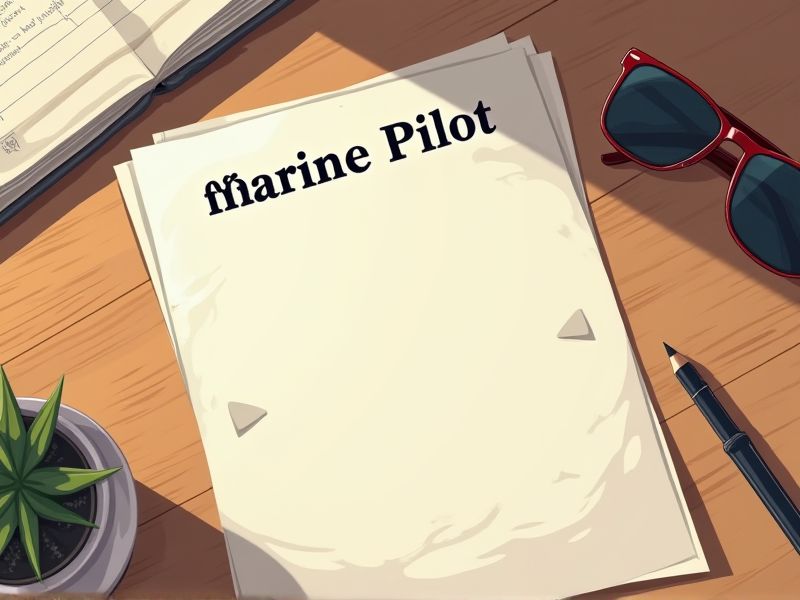
Marine pilots are responsible for safely navigating vessels through challenging waters, requiring a deep understanding of maritime conditions, ship maneuverability, and navigational systems. Specialized certifications ensure that they possess crucial expertise in handling diverse situations, such as adverse weather or crowded ports. Regulatory bodies mandate these certifications to maintain high safety and operational standards. Here are some essential certifications required for a marine pilot.
STCW Basic Safety Training Certificate
The STCW Basic Safety Training Certificate ensures that a marine pilot possesses essential safety skills, reducing accident risks in marine operations. It enhances the pilot's ability to respond effectively to emergencies, safeguarding lives and assets on board. Compliance with international maritime safety standards is necessary, and the certificate demonstrates adherence to these regulations. Training equips pilots with knowledge of fire prevention, survival techniques, and first aid, which are crucial for maintaining safety at sea.
Advanced Firefighting Certificate
A Marine Pilot must possess an Advanced Firefighting Certificate because it ensures they have the essential skills to manage fire-related emergencies at sea. The unpredictable nature of marine environments demands that pilots are proficient in handling fires to safeguard both crew and vessel. This certification also reflects adherence to international safety standards, crucial for maritime operations. Competency in advanced firefighting solidifies trust in the pilot's ability to protect valuable maritime assets.
Marine Pilot Certification (Country/Region Specific)
Marine pilots require certification specific to a country or region because it ensures they are familiar with local waterways, which can have unique navigational challenges. This certification helps in maintaining safety standards tailored to the specific environmental conditions and regulations of the area. Local marine laws and guidelines can vary significantly, making region-specific knowledge crucial for legal compliance. Certification processes often include assessments that validate a pilot's capability to handle unforeseen local maritime circumstances, reducing the risk of accidents.
Bridge Resource Management (BRM) Certificate
Marine pilots need the Bridge Resource Management (BRM) Certificate because it addresses the complexities of ship navigation and enhances safety. BRM training focuses on effective communication and team coordination, crucial in preventing accidents. The certificate emphasizes decision-making and situational awareness, which are vital in the unpredictable maritime environment. Obtaining the BRM certificate reduces human error by equipping pilots with tools to manage resources efficiently.
GMDSS (Global Maritime Distress and Safety System) Certification
Marine Pilots must have GMDSS Certification to ensure they can effectively communicate during maritime emergencies, crucial for safety at sea. The certification equips them with the skills to use advanced communication equipment, vital for coordinating rescue operations. Standardizing communication protocols through this certification minimizes misunderstandings between vessels, which reduces the risk of accidents. Regulatory bodies require this certification to align with international maritime safety standards, enhancing overall maritime security.
Radar Navigation Proficiency Certificate
The Radar Navigation Proficiency Certificate is essential for marine pilots as it ensures they can effectively interpret radar imagery, which is crucial for safe navigation in poor visibility conditions. The certificate confirms their ability to assess distances and detect obstacles, reducing the risk of maritime accidents. It also guarantees that pilots are equipped with the necessary skills to maintain course and speed control in congested waters. This certification enhances situational awareness, which directly impacts the safety of crew and cargo.
Ship Handling and Manoeuvring Certificate
Marine pilots require the Ship Handling and Manoeuvring Certificate to ensure they possess advanced skills in navigating complex and congested waterways. The certification provides assurance to port authorities and shipping companies about the pilot's capability in handling large vessels safely. Accidents and near-misses are significantly reduced when marine pilots are well-trained, as they can effectively respond to various maritime conditions. The certificate sets a standardized level of competence, fostering trust in global maritime operations.
Advanced Navigation Techniques Certificate
The Advanced Navigation Techniques Certificate equips marine pilots with up-to-date skills, increasing their ability to ensure safe and efficient vessel movement, especially in complex waterways. With technological advances in navigation systems, such certification validates a pilot's expertise in operating contemporary equipment. Enhanced navigation skills reduce the risk of accidents, protecting both the vessel and the marine environment. Regulatory bodies often mandate such certifications to comply with international safety standards, maintaining consistent operational protocols.
Maritime Security Awareness Certification
Marine pilots operate within complex and high-risk environments, thus possessing Maritime Security Awareness Certification enhances their ability to identify potential threats and vulnerabilities. The certification educates them on international security regulations and protocols, ensuring compliance and reducing liabilities for port authorities and shipping companies. With increased awareness, marine pilots can contribute to preventing unlawful acts that jeopardize maritime safety. This certification fosters a collective security effort, benefiting the broader maritime community by elevating overall operational standards.
Environmental Protection & Pollution Prevention Certificate
Marine pilots are responsible for navigating ships through environmentally sensitive waterways, making an Environmental Protection & Pollution Prevention Certificate crucial to ensure they possess the necessary knowledge to minimize ecological impact. Obtaining this certificate equips pilots with skills to prevent and respond to accidental spills or emissions while maneuvering large vessels. The focus on pollution prevention directly supports compliance with international maritime regulations, which are becoming increasingly stringent to protect marine biodiversity. Possessing this certification can enhance a pilot's expertise in sustainable navigation practices, aligning their actions with global sustainability efforts.
Summary
When you obtain certifications as a Marine Pilot, it enhances your navigational credibility and expertise. This recognition can increase your opportunities for job advancement and higher responsibilities within maritime operations. Vessel safety and efficiency in complex maritime environments improve as certified pilots apply their advanced skills. Consequently, maritime organizations may prioritize hiring certified pilots, leading to a more competent and trusted workforce.
